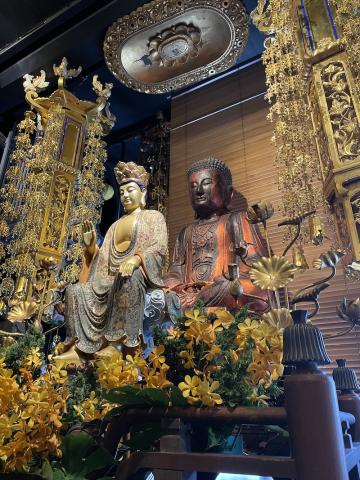
Whenever someone asks me, “What’s your dream destination?”, my response is always, and almost immediately: Vietnam. For 20 years, I had spent my life only seeing my family through a screen, so when the opportunity to study abroad struck I had to take it. It was also a wonderful chance to expand on my interest in Global Health, more specifically my interests in infectious diseases.
My time in Vietnam thus far has been filled with many amazing experiences involving reconnecting with my family and culture. I will never forget singing karaoke in a van with 10 of my mom’s friends, contracting Dengue Fever, and the countless cafe’s I went to with friends. In addition to this, I primarily do research in a wet lab as well as on the aftermath of disease eradication campaigns, so gaining the field and career insight on clinical research made my little research heart very happy.
While my time in Vietnam has been great, one thing I did not expect was the racism I witnessed and experienced. It would be ignorant to say this was not an impactful part of my trip, and ultimately forced me to reflect more on my identities and values. As such, I think it is important to bring this topic to light so more can be educated on it.
Image
There are many reasons why people decide to study abroad, some including family, culture, learning about specific trades, food, etc. These reasons should be purposeful, with the goal to learn, have fun, and still be respectful. Studying abroad should not be a last minute decision where any country in this region should do, a vacation, or a trip to change the culture or community.
When people go to study abroad it can be very difficult to step out of an ethnocentric mindset, where one's culture heavily influences the way you see other cultures. In the case of my experience, it was unfortunate that some interns did not see locals (and even interns identifying with the race as well) as people, but rather people to pity or call upon. Instances I experienced included some individuals feeling remorse because many locals wake up at 5 am to start their day, wanting to take photos of houseless individuals or individuals such as a receptionist just doing their job, and treating myself and others like a tour guide/translator. Of course, I have tried to educate people on their behavior, but it was unfortunate to see how many acted as bystanders to racism and/or were unaccepting of criticism.
I also feel the need to point out positionality. Studying abroad is a privilege many people do not have. With that being said, one also needs to recognize different economic status, religions, work culture, etc. Perhaps telling a local you spent their day’s budget on one meal and call it “cheap” is not the most sensible, nor is it appropriate to conduct job interviews as a white English speaker with those who are uncomfortable speaking English (and they have a job and money on the line, unlike said intern).
Additionally, many interns may become attached to their study abroad location. This is understandable; however, it is the claim of “never wanting to leave” when perceptions are based on limited experiences that were ultimately more accommodating than acclimating, and does not provide a full sense of the true culture and more so a glimpse. Then, to follow up and judge a culture and community heavily because it does not fit a preconceived standard, or by one bad experience, is absurd.
The idea of trying to shift a community to fit one's standards ties into the idea of (white) saviorism. Volunteering can be great, but thinking positionality, sustainability, and intention wise, perhaps it is not. Take orphanages for instance, where some children are trafficked or taken from families, poor conditions are maintained, and the constant flow of volunteers (who just teach the same English lesson over and over again) can lead to issues of abandonment later on. Furthermore, these volunteer positions can take away job opportunities from local community members.
My experience was at times infuriating, disappointing, but also enlightening. Overall, it is important that one checks their blind spots before studying abroad. Being born to a certain race/privilege isn't inherently someone’s fault; however, one needs to acknowledge this, educate themselves, and recognize that nothing they do can “make up” for the imbalances. It is also important to be open and listen to different perspectives, call out racism when you see it, and think of community sustainability (for instance, how your positionality influences others).
This blog post is a little more passive aggressive because I am (rightfully so) angry with some of the actions of interns on my trip. Of course, not all interns were and are like this, yet it is still important to shed light on my experience and lessons that can be taken from it.
In conclusion, just educate yourself before you go, or just don’t go at all please!
By Dante' James, Diverse Ducks Ambassador
GlobalWorks Internship in Vietnam, Summer 2023
